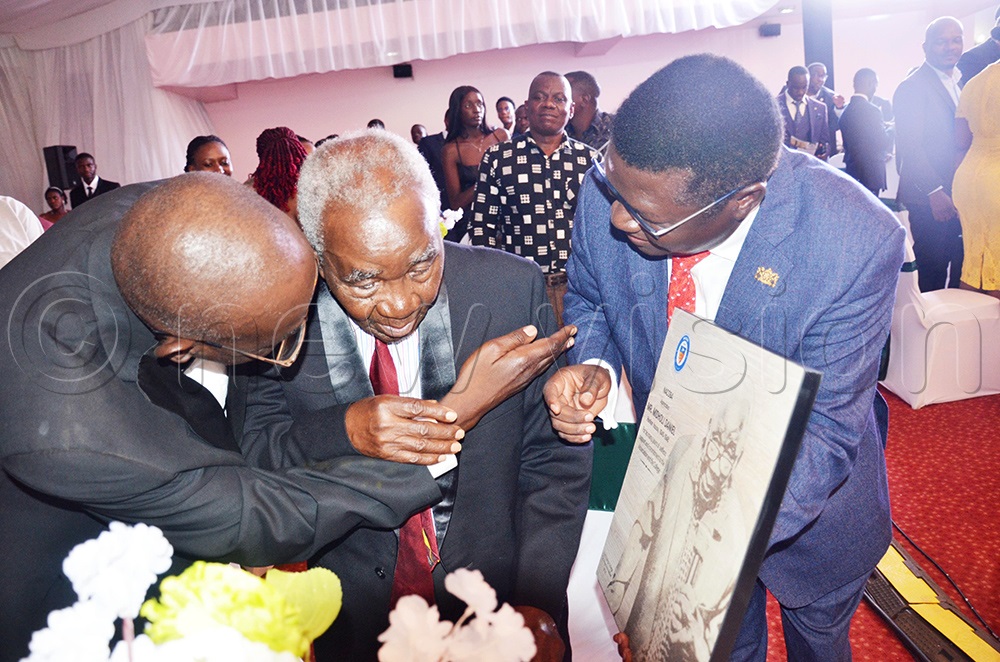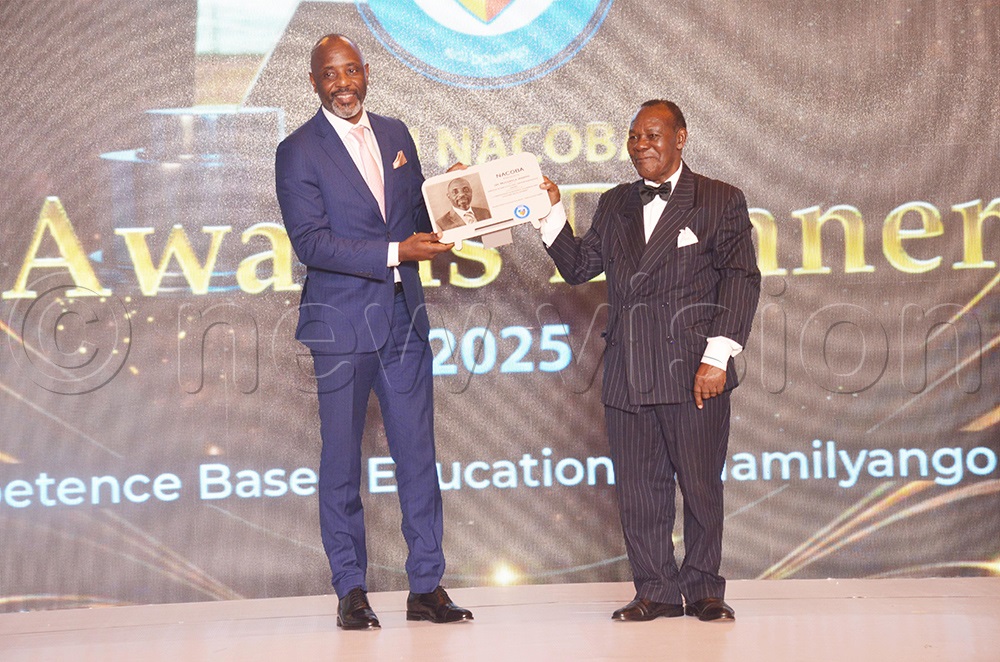Mao calls for overhaul of exam-focused education system
Mao, the guest speaker at the 5th Namilyango College Old Boys Association (NACOBA) awards dinner 2025, held at the Imperial Royale Hotel in Kampala on August 1, 2025, stated that the current schooling system undermines the foundations of education, which should focus primarily on addressing community problems and challenges.
The former Chief Justice Bart Katureebe and Minister of Justice, Nobert Mao (middle) who was the chief guest with Namilyango students at Imperial Royale Hotel. (Photo by Isaac Nuwagaba)
___________________
The justice and constitutional affairs minister, Nobert Mao, has called for a review of Uganda's education system, urging an approach that embraces diversity, inclusivity and critical thinking, rather than mere cramming for examinations.
Mao, the guest speaker at the 5th Namilyango College Old Boys Association (NACOBA) awards dinner 2025, held at the Imperial Royale Hotel in Kampala on August 1, 2025, stated that the current schooling system undermines the foundations of education, which should focus primarily on addressing community problems and challenges.
“There is an education crisis in the country which has led to a decline in the quality of education, making it difficult for students to acquire the skills and knowledge they need to succeed,” Mao said.
Mao, who is also the Democratic Party (DP) president general, proposed a fundamental shift from the one-size-fits-all model to a more inclusive and flexible system that caters to the diverse needs of students.
“When I was still a student at Namilyango in 1982, they never allowed us to read anything from pamphlets, simplified book editions or even revise question–answer booklets for the sake of passing exams,” he disclosed.
Minister of Justice and Constitutional Affairs, Nobert Mao handing over a gift to the oldest Namilyango old boy Daniel Midholi. (Photo by Isaac Nuwagaba)
He said students were taught the basics of knowledge application and critical thinking, which is no longer the case. According to Mao, both parents and teachers are increasingly opting for academies that focus only on enabling learners to cram and pass exams with flying colours.
Mao’s challenge to “rescue education from the teeth of the schooling crisis” is a call to action for educators, policymakers and stakeholders, especially the Ministry of Education, to rethink how education is delivered in Uganda.
He added that a major part of the crisis is the lack of appreciation for basic subjects such as Mathematics, which have direct real-life applications, with students now only pursuing paper qualifications throughout their school years.
“Why do schools no longer want to educate our children?” Mao asked.
Key issues
Some of the key issues Mao said must be addressed to rescue education from the current crisis include increased funding and government investment in public schools, so that children from poor backgrounds can access quality education.
“I myself come from a humble background, but if it was today, I would not have made it to Namilyango. Schools often lack the resources needed to provide quality education, especially textbooks, technology and computers,” he insisted.
Reflecting on his primary school days, Mao recalled having to write notes on the ground, shielding his work from the wind before teachers came to mark it.
“For us, we were children taught like the first students of the Greek philosopher Socrates, who would engage his learners in discussions to prompt critical thinking. Instead of providing direct answers, he would guide his students to examine their own beliefs and assumptions, leading them to arrive at their own conclusions,” Mao informed.
Katureebe decries corruption among legislators
Former Chief Justice Bart Katureebe condemned political elites in the Parliament of Uganda for glorifying corruption, citing the country’s increasing moral decay.
“As a country, we seem to have forgotten. When I had finished S.6, the former President Idi Amin gave 18 reasons for taking over Milton Obote’s government in 1971, and corruption in high offices was number one. Members of Parliament (MPs) do dishonourable things to become honourables, and we need to learn how to win with honour,” he said.
Katureebe, who cited the monetisation of politics as the root cause of corruption, urged citizens to overcome the temptation of bribes and instead uphold national values, which he said are no longer cherished.
“When you bribe voters, you deny them a chance of looking at service delivery as a necessity, which keeps the country behind with poverty, poor infrastructure, a miserable health sector and education. If you are a leader, you must make a distinction between what people want and what they need. People want good schools, health centres, roads, electricity, but not your money,” Katureebe observed.

The Prime Minister of Busoga Kingdom and Executive Director National Planning Authority, Joseph Muvawala receiving an award from Amb Prof. Ssemakula Kiwanuka. (Photo by Isaac Nuwagaba)
He added that many viewed him as “more Catholic” because he rejected numerous bribes during his tenure as Chief Justice, a stance he said was in line with the values instilled in him at Namilyango.
“People used to tell me that I am more of a Catholic because I turned down many bribes when I was the Chief Justice, but I was never disappointed in my service because I behaved like a Namilyango product,” he boasted.
“When you bribe me, you insult me because I am no longer myself, but I become your chattel to play with,” he noted.
Namilyango to convert staff room into computer laboratory
The College Head Teacher, Constantine Mpuuga, appealed to alumni to support the school in acquiring ICT equipment and infrastructure to improve learning.
“We are asking you to contribute and we construct a new staff room because we want to convert the existing staff room into a computer laboratory because the numbers are high for the existing infrastructure,” Mpuuga said.
He noted that the school is experiencing congestion, given its competitiveness, and needs to upgrade its facilities to keep up with rivals.
Mpuuga also honoured the longest-serving old boy still living, Daniel Midholi, who stayed in Hanlon House during his school days from 1945 to 1948. He received a framed picture as an award, presented by Mao.
Other notable old boys present included former Inspector General of Police Martin Okoth Ochola, former FUFA president Lawrence Mulindwa, director general health services at the Ministry of Health Dr Charles Olaro, prime minister of Busoga Kingdom and executive director of the National Planning Authority Joseph Muvawala, and former Ambassador Prof. Ssemakula Kiwanuka.